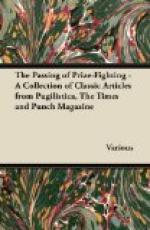I am, Sir, Yours obediently,
EARTH-APPLE.
* * * * *
[Illustration: “HULLO! WHERE’S BABY? I THOUGHT HE WAS WITH YOU.” “SO HE IS, AUNTIE; BUT HE THOUGHT YOU WERE COMING TO FETCH HIM IN, SO HE’S OVER THERE, CAMMYFLAGING HIMSELF WITH A TOWEL.”]
* * * * *
THOROUGHNESS.
It is generally agreed that the War has given women great chances, and that women for the most part have taken them. Where they have not, but have preferred frivolity, it is not always their own fault, but the result of outside pressure. Such a paragraph, for example, as the following, by “Lady Di,” in The Sunday Evening Telegram, is hardly a clarion call to efficiency:—
“This recurrence of night raids has made business brisk in the lingerie salons, especially among flatland dwellers, for it’s quite the thing now to have coffee and cake parties after a raid, with brandy neat in liqueur glasses for those whose nerves have been shaken. And such parties do give chances for the exhibition of those dainty garments that usually you have to admire all by yourself. Which reminds me. Don’t forget an anklet and a wristlet of black velvet—the wristlet on the right and the anklet on the left!”
Since “Lady Di” is out for making the most of every opportunity, and since even she might forget something, I am minded to help her, two heads being often better than one. Air raids are not the only unforseen perils. Surely some such paragraph as this would be useful and indicate zeal:—
The escape of German prisoners being of almost daily occurrence, it would be well for all women who wish never to be taken unawares to be prepared to look their best should one of these creatures meet them. For nothing is lost by looking nice; indeed it is one’s duty to be smart, lest dowdiness should give him the impression that England really is suffering from the War. A costume which I have designed to be seen in by escaping German prisoners is a “simple” one-piece (not peace) frock—which, when built by a real artist, can be so intriguing. Of ninon, for choice, with a Duvetyn hat. Carry a gold purse and lift the skirt high enough to show the finest silk stockings.
* * * * *
THE CROSSBILLS.
A Northern pinewood once we knew,
My dear, when younger by some
lustres,
Where little painted crossbills flew
And pecked among the fir-cone
clusters;
They hobnobbed
and sidled
In
coats all aflame,
While young Autumn
idled,
And
we did the same.
They’re cutting down the wood, I
hear,
To make it into war material,
And, where the crossbills came, this year
Their firs are lying most
funereal;
There’s
steam saw-mills humming
And
engines at haul,
A new Winter coming
And
more trees to fall.




